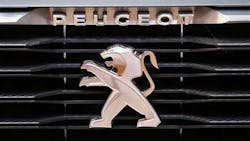Peugeot Confirms Talks With Chinese Carmaker, GM Pulls Out
PARIS -- Peugeot confirmed today it is in talks with Chinese giant Dongfeng about a shareholder tie-up, while General Motors announced it is dropping its 7% stake in the loss-making French carmaker.
PSA Peugeot Citroen (IW 1000/55), the second-biggest carmaker in Europe after Volkswagen (IW 1000/7), stressed that there had not been any agreement on a tie-up and that the talks were at a preliminary stage, but the statement issued by GM (IW 500/5) said Peugeot no longer needed its support.
A tie-up with Dongfeng would give Peugeot a much-needed cash injection, cement its relationship with China's second-biggest carmaker, and boost its access to the fast-growing market.
Dongfeng, for its part, has only said that it is studying the rationality of taking a stake in Peugeot.
A source familiar with the talks said the amount of the capital injection being considered is 3.5 billion euros ($4.8 billion).
The most probable scenario would involve Dongfeng and the French state in equal measure buying up a majority of the newly issued shares, with other French investors taking the rest, said the source.
As the European car market and its sales remain stuck in a slump, Peugeot has moved to revamp its management and there has been talk of a major shake-up in the ownership of the company.
Reports in recent months have hinted at a sharp reduction in the holding of the Peugeot family, which controls about a quarter of the shares and 38.1% of the voting rights, losing its controlling interest.
Peugeot will "remain French," Industrial Renewal Minster Arnaud Montebourg said on the reports of the Dongfeng talks. The Prime Minister's office said it was following the talks "very closely."
Unexpected Pullout
In a surprise move, U.S. carmaker General Motors announced today it is selling its entire 7% stake in Peugeot.
GM explained the move by saying its equity support was no longer needed, but a capital injection would also dilute its holding and value.
"Our equity stake was planned to support PSA in their efforts to raise capital at the time of the creation of the GM and PSA alliance, and that support is no longer needed," GM Vice Chairman Steve Girsky said.
The alliance, which dates to March 2012, aimed to improve both companies' positions in Europe after the regional market plunged into a deep slump, weakening many major automakers there, including GM's loss-making German unit Opel.
The two have been laying plans to achieve savings by pooling purchases of parts and jointly developing new auto platforms.
Girsky stressed this cooperation would continue.
"The alliance remains strong with our focus on joint vehicle programs, cross manufacturing, purchasing, and logistics," he said. "We're making good progress while remaining open to new opportunities."
Peugeot later acknowledged GM's announcement of the disposal of the share stake "as well as the strong commitment GM reaffirmed to our strategic alliance."
French Finance Minister Pierre Moscovici said, "What is important is the industrial partnership between PSA and GM, which has been strengthened."
While announcing progress in their joint endeavors, GM and Peugeot also said they have decided to drop plans to develop one joint platform for a small car.
This will result in the savings from their cooperation coming in at around 1.2 billion euros instead of the 2.0 billion by 2018 that was previously being targeted.
Peugeot Shares Fall
Shares in Peugeot nosedived 7.6% to 10.63 euros today on a Paris market that lost 0.43% overall.
In addition to the prospect of a capital injection that would dilute their shares, traders were also disappointed by an announcement by the carmaker that it would have to write off about 1.1 billion euros from its full year earnings due to worsening markets and unfavorable exchange rates in Russia and Latin America.
"The impairment charges, which may represent around 1.1 billion euros, will reduce consolidated results by the same amount but will not involve any cash-out," the company said.
Peugeot had been looking to other parts of the world, such as China and Argentina, for growth.
But the group said today that current exchange rates were unfavorable.
A one-percentage-point change in the euro against other currencies, including the Brazilian real, the Argentine peso and the Russian ruble, will have an impact of around 80 million euros on Automotive Division recurring operating income based on current market conditions, the group said.
Peugeot lost 426 million euros ($566 million) in the first half of the year. It reported a full-year loss of 5.0 billion euros for 2012, and its finance arm had to be rescued with government support.
Western automakers have been looking beyond Europe and the United States for growth as sales in their home markets have collapsed amid a series of economic crises.
China, with its forecast potential to grow to a automobile market of 22 million units by 2020, is a natural magnet for these groups.
Peugeot already has a joint venture with Dongfeng to make cars in China. But Dongfeng sealing earlier this month a similar deal with rival French auto group Renault raised questions over whether it would go ahead to deepen its involvement with Peugeot.
Earlier in December, Dongfeng and Renault announced a $1.3 billion joint venture that includes the production of 150,000 multipurpose vehicles and engines a year.
The Dongfeng group, including its joint ventures, sold 3.08 million vehicles in China last year, according to industry group China Association of Automobile Manufacturers, giving it a 16% market share.
Copyright Agence France-Presse, 2013
About the Author
Agence France-Presse
Copyright Agence France-Presse, 2002-2025. AFP text, photos, graphics and logos shall not be reproduced, published, broadcast, rewritten for broadcast or publication or redistributed directly or indirectly in any medium. AFP shall not be held liable for any delays, inaccuracies, errors or omissions in any AFP content, or for any actions taken in consequence.
